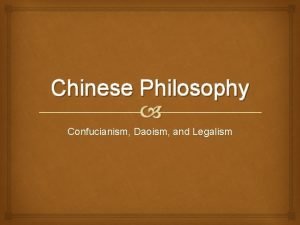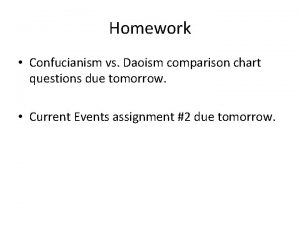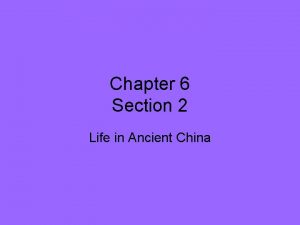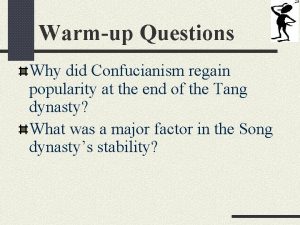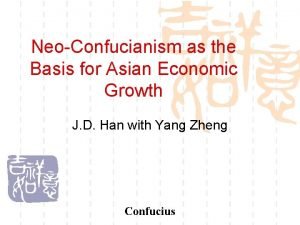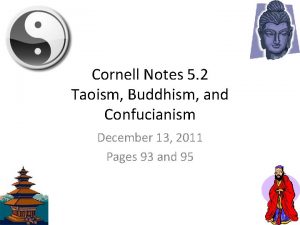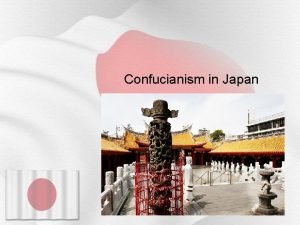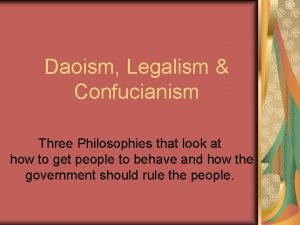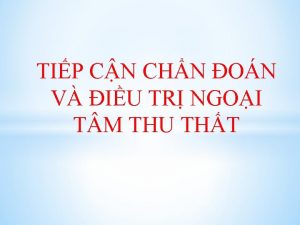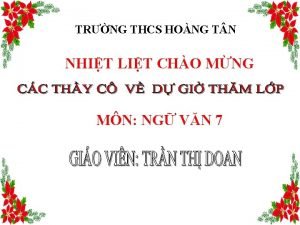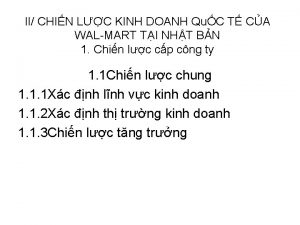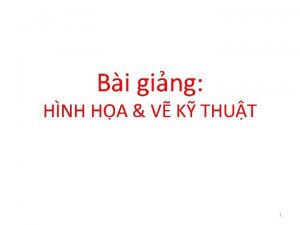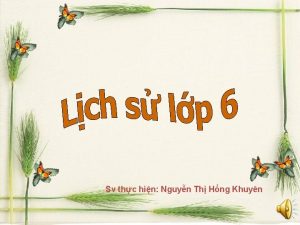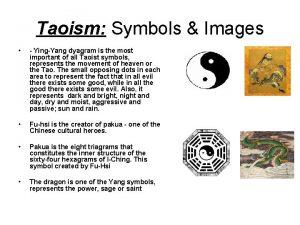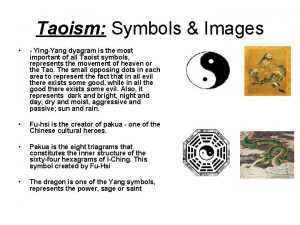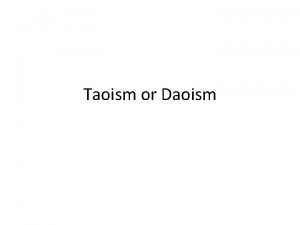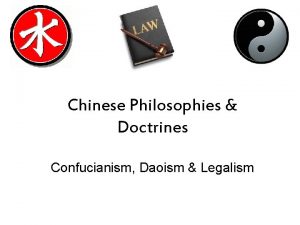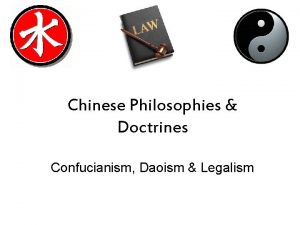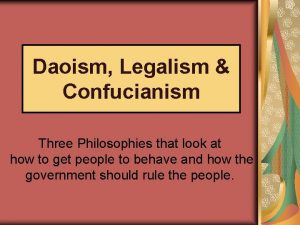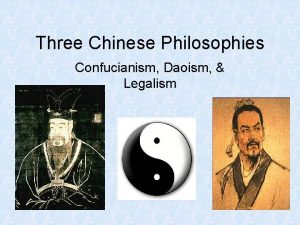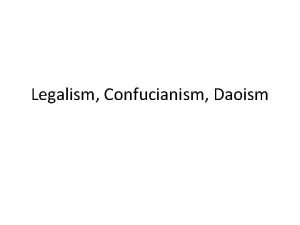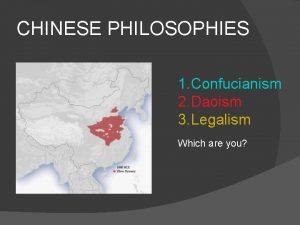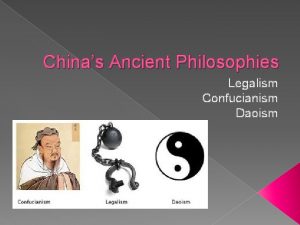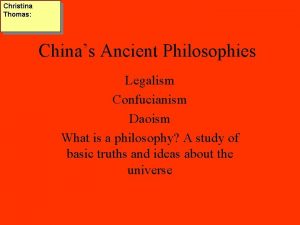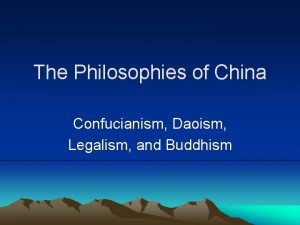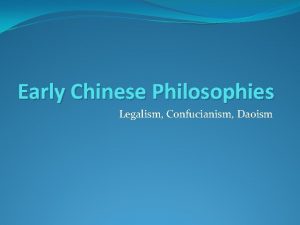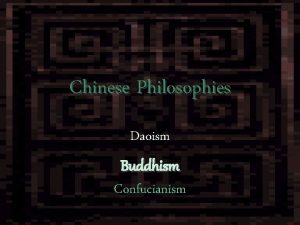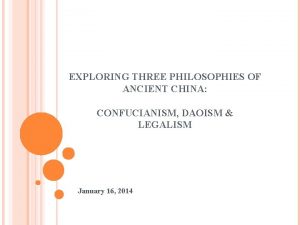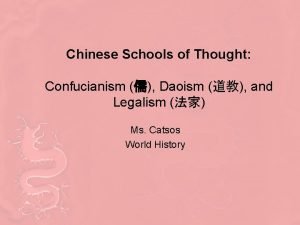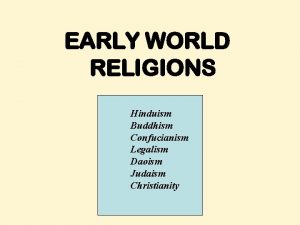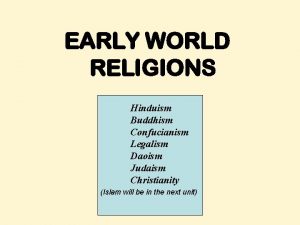Sikhism Daoism Legalism Confucianism Three Philosophies that look






















- Slides: 22

Sikhism, Daoism, Legalism & Confucianism Three Philosophies that look at how to get people to behave and how the Government should rule the people.

Sikhism 30 million Sikhs worldwide Follow the ten gurus, first was Nanak Sahib Born in the 15 th cent. , CE Main scripture: Gurū Granth Monotheistic- one god

Sikh Beliefs God is not fully knowable Can only be seen through the heart, by meditation God is genderless, formless Final destination is spiritual union with God Maya – ‘unreality’ Results in separation from God Five evils: ego, anger, greed, attachment, lust All are equal in God’s eyes Women can lead in prayers

Sikh Practices Langar – community meal Served at the Gudwara (Sikh place of worship) to the entire community Naming ceremony All boys are given the last name Singh (‘lion’) and girls the last name Kaur (‘lioness’) Guru Granth Sahib is opened randomly and the child is given a name with the first letter on the top left hand corner of the left page. Sikhs are required to marry when they reach a certain age; divorce is prohibited

Sikh Practices The Five K’s kēs (uncut hair) kaṅghā (small wooden comb) kaṛā (circular steel or iron bracelet) kirpān (sword/dagger) kacchera (special undergarment) Prohibitions: Cutting hair Intoxication Adultery Blind spirituality Material obsession Sacrifice of creatures Non-family-oriented living Worthless talk Priestly class Eating meat killed in a ritualistic manner Having premarital or extramarital sexual relations

Daoism/Taoism

Daoism/Taoism Started by a man named Lao Tsu who lived about 600 BC Is a philosophy (way of thinking) but turned into a religion Lao Tsu believed that people needed to go with the flow (wu-wei) let nature take its course

Yin and Yang Believed everything in the universe had a life force- a yin and yangopposites Yin-dark side- is women, moon, things that are still & death Yang-light side-is men, sun, things that move & birth Must keep the yin and the yang balanced

Beliefs… Wrong for people to fight Wrong for government to make rules and laws Against any kind of rules, diets, etc. Had theories regarding the body, diet, breathing and physical exercises, uses of herbs, philosophical inquiry and meditation. All of these the Taoist feels brings a human being into closer alignment with the “natural order” of life and living

3 Jewels to be sought…. Compassion- awareness of another person’s pain and wanting to relieve it Moderation- avoid extremes Humility- modest, don’t brag

Legalism

Legalism Beliefs Believed that people were bad and needed to be controlled Religion wasn’t involved Believed society needed strict laws People should be responsible for other people’s actions. EX- neighbors and relatives should also be punished Scare people into obeying laws

Legalism There are 3 parts to Legalism ~fa (law) ~shi (legitimacy) ~shu (arts of the ruler)

Fa (law) Laws were written and made public The laws ran the state the rulers did not Laws were enforced by strict rewards and punishments

Shi (legitimacy) Keeping order was the first priority Anyone could rule as long as laws were in place

Shu-arts of the ruler Rulers should not be kind Being kind leads to failure They need to be strict otherwise people get disrespectful and lazy

Confucianism

Confucius and Society During Zhou Dynasty Confucius, a man, felt that China was full of rude, dishonest people He wanted people to return to having good ethics

Confucius's rules for Families Fathers should be role models for family Children should respect and obey their parents Families should be loyal to one another

Confucius’ Rules for Government Do not have strict laws Have leaders be good role models for morals and behavior King should inspire good behaviornot scare people into good behavior

Confucius Proverbs A man who has committed a mistake and doesn't correct it is committing another mistake. Our greatest glory is not in never falling, but in rising every time we fall. Real knowledge is to know the extent of one's ignorance.

Confucius Teachings Confucius traveled all over teaching his ideas His teachings were put into a book called The Analects Confucianism is meant to guide behavior
 Confucianism daoism and legalism
Confucianism daoism and legalism Confucianism daoism and legalism chart
Confucianism daoism and legalism chart Why did many aristocrats favor the philosophy of legalism?
Why did many aristocrats favor the philosophy of legalism? Looking down to the left
Looking down to the left Neo confucianism vs confucianism
Neo confucianism vs confucianism Neo confucianism vs confucianism
Neo confucianism vs confucianism Neo confucianism vs confucianism
Neo confucianism vs confucianism Confucious values
Confucious values Legalism teachings
Legalism teachings Ngoại tâm thu thất chùm đôi
Ngoại tâm thu thất chùm đôi Block nhĩ thất độ 2 mobitz 1
Block nhĩ thất độ 2 mobitz 1 Thể thơ truyền thống
Thể thơ truyền thống Thơ thất ngôn tứ tuyệt đường luật
Thơ thất ngôn tứ tuyệt đường luật Walmart thất bại ở nhật
Walmart thất bại ở nhật Tìm vết của đường thẳng
Tìm vết của đường thẳng Con hãy đưa tay khi thấy người vấp ngã
Con hãy đưa tay khi thấy người vấp ngã Tôn thất thuyết là ai
Tôn thất thuyết là ai Gây tê cơ vuông thắt lưng
Gây tê cơ vuông thắt lưng Sau thất bại ở hồ điển triệt
Sau thất bại ở hồ điển triệt Daoism founder
Daoism founder Taoist symbols
Taoist symbols Daoism symbols
Daoism symbols Taoism government
Taoism government
